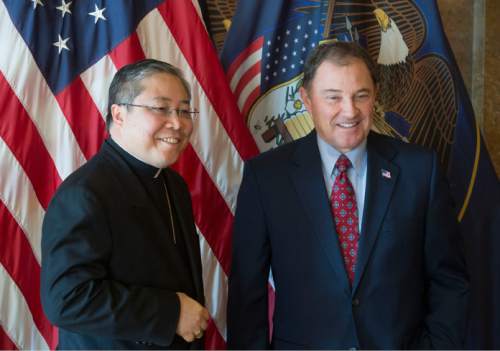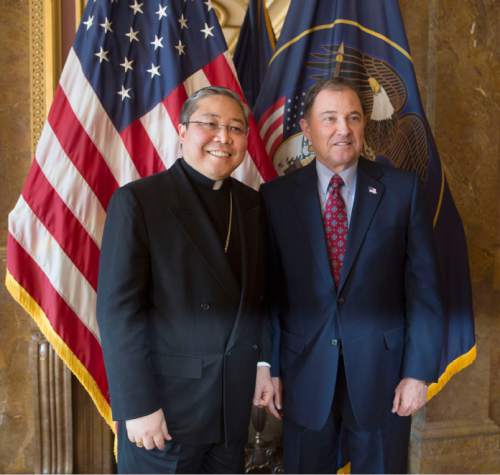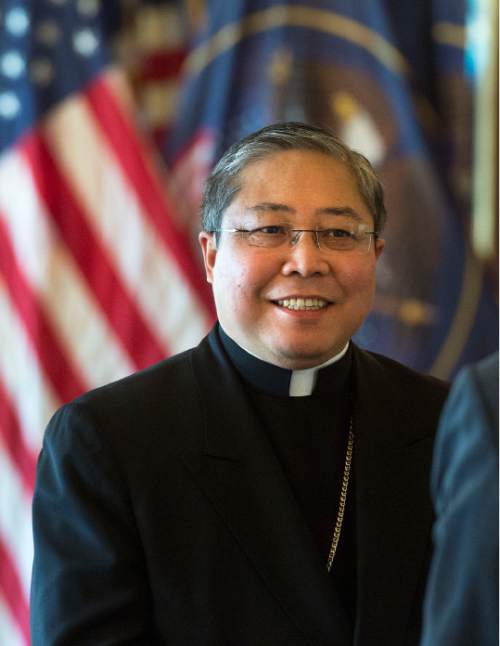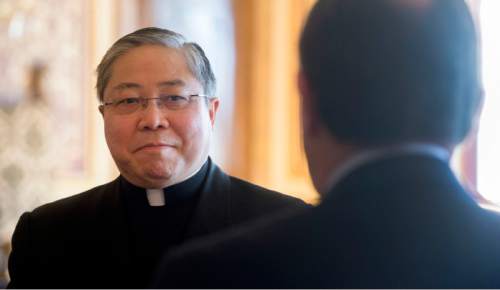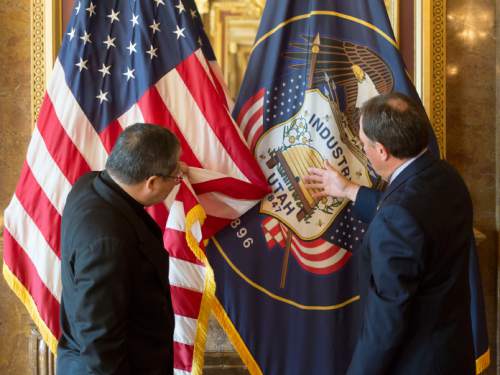This is an archived article that was published on sltrib.com in 2015, and information in the article may be outdated. It is provided only for personal research purposes and may not be reprinted.
America's Founding Fathers may have enshrined religious liberty in the First Amendment, but that didn't protect either Catholics or Mormons from being mistreated, imprisoned and harassed.
"We have both suffered, in fact, a lot over the course of history for our faith from the biases of our fellow citizens," Archbishop Bernardito Auza, permanent observer of the Holy See to the United Nations, said Monday evening at Utah Valley University in Orem.
Auza, who met with Utah Gov. Gary Hebert in the afternoon, was the scheduled keynote speaker of the 2015 Mormon Studies Conference, titled "Mormons and Catholics: From the Margins to the Mainstream."
Several American states "devised loyalty oaths precisely in order to exclude Catholics from state and local offices," the archbishop said in prepared remarks provided by UVU. "The mid-19th-century 'nativist' movement whipped anti-Catholicism into such a frenzy that mobs burned churches, convents, Catholic home and killed many Catholics."
Mormons have likewise suffered, Auza said, "sometimes, sadly, even from Catholics."
The archbishop mentioned the 1838 Hawn's Mill Massacre in which several Mormons were killed and the 1844 murder of LDS Church founder Joseph Smith.
"Because we did not always find a welcome mat, we needed in that crucible to learn how to welcome and provide for our fellow members, building the institutions to embrace, educate, help, nourish, insure, and hospitalize them," Auza said. " ... Rather than wallowing in self-pity and playing the card of a victim, Catholics and Mormons both took advantage of the freedoms and opportunities still available in the United States to build institutions that have endured the passage of time."
Now the two denominations, he said, have much in common: a focus on the family, emphasis on education, charity, "living and sharing our faith publicly."
These days, the "model of the family that we hold dear is under unprecedented conceptual attack," Auza said. "Many of the attacks against religious freedom have their starting point in the attempted conceptual deconstruction of the family."
Auza said he was aware of the cooperation between the Utah-based Church of Jesus Christ and Latter-day Saints and the Catholic Church here, "especially on the four key values we share."
His visit comes a month after the LDS Church promoted passage of a landmark bill granting statewide protections against housing and employment discrimination for gay and lesbian Utahns while providing some religious-freedom exemptions.
In his prepared text, the archbishop didn't mention the bill as evidence of Mormon/Catholic cooperation but did cite the invitation of several prominent Catholic clergy to speak at LDS Church-owned Brigham Young University and other Utah campuses along with Mormon support for the Cathedral of the Madeleine in downtown Salt Lake City.
Freedom is a "gift of God, just like beauty, goodness and peace," Auza said. "And just like these gifts, it is ever ancient and ever new. ... It is a challenge held out to each generation, and it must constantly be won over for the cause of good."
Religious freedom is the "first freedom," a fundamental human right "from which other rights necessarily flow, and which must always be protected, defended and promoted."
Pope Benedict XVI saw religious liberty as "the pinnacle of all other freedoms," and Pope Francis affirmed it as "a fundamental human right which reflects the highest human dignity, the ability to seek the truth and conform to it."
Today, Auza said, religious persecution "is emerging with an increased frequency and barbarity worldwide."
Countries such as Iraq, Syria, Nigeria and Libya have been "literally soaked with [Christian] blood," he said. " ... Even as we speak, thousands are being killed, persecuted, deprived of their fundamental human rights and discriminated against simply because they profess a faith, in particular if they are Christians."
Persecutors have not succeeded "in suppressing individuals and peoples from professing a religious belief," Auza said.
"And it can never be suppressed because it springs from the very nature of the human person himself or herself."


